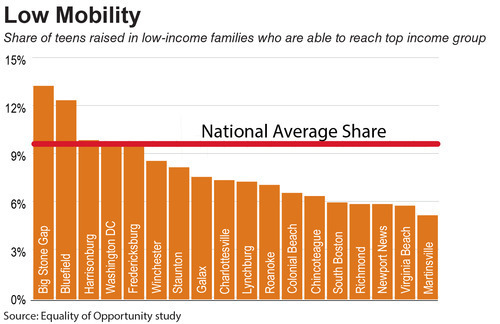August 21, 2013
A Commonwealth of Unequal Opportunity
Virginia has a lot of things going for it. Below-average unemployment. Some of the best public universities around. And a median family income among the highest in the country. It’s the American Dream, right?
Not so fast. Turns out that upward mobility across generations—that is, the ability of low-income children to achieve a better economic position than their parents—is low in most areas of Virginia. How low?
If there were perfect equality of opportunity, we would expect 20 percent of kids raised in low-income families to end up among the top 20 percent of the income spectrum. Nationally, roughly 10 percent of teens whose parents had low incomes achieve this level of success. But in 15 of 18 regions in Virginia (including the Washington, DC region), the chance of a low-income teen moving into the top income group is below that, according to a new study by the Equality of Opportunity Project. In both the Richmond and Virginia Beach areas, less than 6 percent of low-income kids move into the highest income group.

It gets worse. In no area of Virginia are teens whose parents earned modest incomes likely to make above-average incomes as adults. And there is a bigger gap between the adult incomes of children raised in the highest-income families and those raised in the lowest in almost all areas of Virginia than is typical in the United States.
Why do lower-income children in many areas of Virginia have a worse chance of moving up in the world than their counterparts in other states? According to the authors of the Equality of Opportunity study, low upward mobility is correlated with the following factors:
- A smaller and more geographically separated middle class;
- Lower-quality K-12 schools;
- Lower levels of social engagement and less stable families;
- A less generous (or nonexistent) state earned income tax credit; and
- Lower local tax rates (Higher local taxes are positively correlated with upward mobility.)
By the key measure of upward mobility for children raised in lower-income families, most of Virginia’s communities are failing. Unless we create realistic pathways for all of our state’s children to achieve their piece of the American Dream we cannot say we have an economy that works for all of us. The Equality of Opportunity study points to the factors that might help Virginia be a success story for upward mobility. It’s time to stop dreaming and get to work.
–Laura Goren, Policy Analyst
